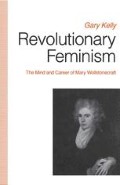Abstract
A Vindication of the Rights of Woman, like most of Wollstonecraft’s work, was conceived and written quickly. She had it in mind by June 1791, began writing in the autumn, gave the manuscript to the printer as she wrote and corrected final proofs in early January 1792. Not surprisingly, she told William Roscoe: ‘I am dissatisfied with myself for not having done justice to the subject’, and complained that had she more time she ‘could have written a better book, in every sense of the word’; but, she adds, those who must write for pay have no choice but to write in haste, unlike ‘gentlemen authors’ such as Roscoe (Letters, p. 205). The book’s ‘Advertisement’ claims that a sequel will include ‘a full discussion of the arguments which … rise naturally from a few simple principles’, ‘the laws relative to women’ and ‘the consideration of their peculiar duties’, but admits that ‘fresh illustrations’ occurred as she wrote, so that ‘only the first part’ is now presented to the public.
Access this chapter
Tax calculation will be finalised at checkout
Purchases are for personal use only
Preview
Unable to display preview. Download preview PDF.
Notes
See Joan B. Landes, Women and the Public Sphere in the Age of the French Revolution (Ithaca, N.Y., and London: Cornell University Press, 1988).
For a different account of Wollstonecraft’s themes and rhetorical strategies, see Mary Poovey, The Proper Lady and the Woman Writer: Ideology as Style in the Works of Mary Wollstonecraft, Mary Shelley, and Jane Austen (Chicago, Ill., and London: University of Chicago Press, 1984)
Mary Wollstonecraft, A Vindication of the Rights of Woman, ed. Carol Poston, 2nd ed (New York: W. W. Norton, 1988) p. 78
Christine Battersby, Gender and Genius: Towards a Feminist Aesthetics (London: Women’s Press, 1989) p. 83.
See Gary Kelly, English Fiction of the Romantic Period, 1789–1830 (London and New York: Longman, 1989) pp. 42–6.
See The Dialogic Imagination: Four Essays by M. M. Bakhtin, ed. Michael Holquist, trans. Caryl Emerson and Michael Holquist (Austin, Tx.: University of Texas Press, 1981). For a reading of Chapter 5 of A Vindication in relation to Bakhtin, see Patricia Yaeger, Honey-Mad Women: Emancipatory Strategies in Women’s Writing (New York: Columbia University Press, 1988) pp. 149–76.
On Wollstonecraft’s reply to Rousseau see Diana H. Coole, Women in Political Theory: From Ancient Misogyny to Contemporary Feminism (Hemel Hempstead, Herts: Harvester Wheatsheaf, 1988)
R. M. Janes, ‘On the Reception of Mary Wollstonecraft’s “A Vindication of the Rights of Woman”’, Journal of the History of Ideas, vol. 39 (1978) pp. 293–302
Mary Wollstonecraft, A Vindication of the Rights of Woman, ed. Carol H. Poston, 2nd edn (New York and London: W. W. Norton, 1988).
Eleanor Flexner, Mary Wollstonecraft (New York: Coward, McCann and Geoghegan, 1972) p. 164
Claire Tomalin, The Life and Death of Mary Wollstonecraft (London: Weidenfeld and Nicolson, 1974) p. 105
Ellen Moers, Literary Women (Garden City, N.Y.: Anchor Books, 1977) p. 225.
For example, two important essays dealing with Wollstonecraft by Cora Kaplan, ‘Wild Nights: Pleasure/Sexuality/Feminism’ (1983) and ‘Pandora’s Box: Subjectivity, Class and Sexuality in Socialist Feminist Criticism’ (1985), both republished in Sea Changes: Culture and Feminism (London: Verso, 1986).
Author information
Authors and Affiliations
Copyright information
© 1992 Gary Donald Kelly
About this chapter
Cite this chapter
Kelly, G. (1992). ‘A Revolution in Female Manners’. In: Revolutionary Feminism. Palgrave Macmillan, London. https://doi.org/10.1007/978-1-349-22063-2_5
Download citation
DOI: https://doi.org/10.1007/978-1-349-22063-2_5
Publisher Name: Palgrave Macmillan, London
Print ISBN: 978-1-349-22065-6
Online ISBN: 978-1-349-22063-2
eBook Packages: Palgrave Religion & Philosophy CollectionPhilosophy and Religion (R0)

